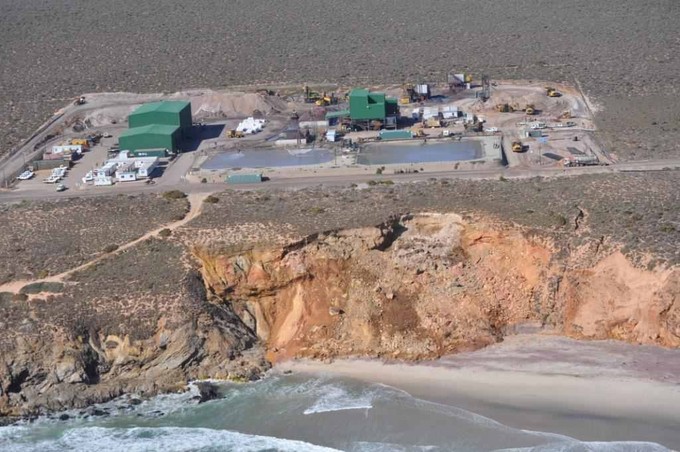

Collapsed cliff at the Tormin Mine on the West Coast. Archive supplied photo
6 February 2019
Australian-owned mining company Mineral Sands Resources (MSR) has been fined R1.25 million for unlawful activities at its Tormin heavy minerals mine on the West Coast near Lutzville.
The two transgressions involved clearing a 3.9 hectare area for stockpiling material, and the construction of a 2.2 hectare dam in a cleared area of 4.1 hectares – both without the required environmental permission and in contravention of the conditions of the company’s mining licence.
The contraventions were identified early last year during an assessment of the environmental management programme at the 120-hectare mine where valuable heavy minerals such as ilmenite, leucoxene and rutile (titanium oxide minerals), zircon and garnets are excavated from several beaches.
MSR then submitted a Section 24G (rectification) application for its activities to be condoned. The fine is part of this rectification process.
The mining company stands accused of many other environmental and legal transgressions and violations, including: causing the collapse of a major sea cliff by mining within a 10-metre exclusion zone at the toe of the cliff; dumping mine tailings into the sea without a permit; developing a jetty; widening a haulage road from the beach without permission; exceeding the approved volume of mined material transported by truck to harbours; and using unauthorised routes for the trucks.
The company has either denied these other allegations or said they do not constitute unlawful behaviour.
The R1.25m fine is hopelessly too low says environmental activist Suzanne du Plessis, who commented on the company’s application to the Minister of Environmental Affairs to rectify its activities. Du Plessis is also a current active member and past chairperson of the Olifants Estuary Management Forum.
Describing the fine as “a complete joke”, Du Plessis said mining operations at Tormin should have been halted when the department became aware of the environmental transgressions, and it should only have been allowed to resume once the rectification process had been finalised, with the payment of the fine.
“If you look at this in dollar terms [currently about US$90,500], it’s a pittance,” said Du Plessis. “This is a little slap on the wrist; they should have been fined R1.25 million for each transgression.”
Another strong critic of MSR’s mining record at Tormin is the Western Cape’s Department of Environmental Affairs and Development Planning (DEADP) department. Commenting late last year on an environmental impact assessment report of the mine’s proposed expansion, it recommended that that any future application by MSR not be considered until the allegations of unlawfulness had been resolved.
In a letter dated 14 December 2018, the Department of Mineral Resources told MSR it was issuing an administrative fine of R1.25 million for the two unlawful activities identified by independent consultants Jomela Consulting, in February last year.
The department said a committee had taken into account “socioeconomic impact, biodiversity impact, sense of place, heritage impact and the pollution impact”.
On 8 January, MSR sent a copy of the department’s letter to interested parties, explaining that they had 20 days to appeal the size of the fine.
At the time of publishing, neither the Department of Mineral Resources nor MSR had responded to GroundUp’s questions as to whether the fine had been paid.
MSR is a subsidiary of of Mineral Commodities Ltd that trades on the Australian Securities Exchange as MRC. It is also the majority owner of the company that has been attempting to establish a controversial heavy minerals mine at Xolobeni in Pondoland for the past 15 years.
Mineral Resources minister Gwede Mantashe is scheduled to visit the Tormin mine on 8 February.